7 Myths About Breastfeeding
A lactation expert explains the misconceptions surrounding nursing a baby and reassures new mothers.


As an obstetric nurse, Mary Lou Mulholland sees a lot of new parents worried about breastfeeding.
“I’m not making enough milk, I’m going to starve my baby, and my anatomy isn’t right are common concerns,” says Mulholland, RNC-OB, C-EFM, CLC, a staff nurse and lactation counselor in the postpartum unit at the NewYork-Presbyterian Alexandra Cohen Hospital for Women and Newborns.
In most cases, these new moms end up breastfeeding successfully after receiving support from the hospital’s nurses and lactation experts.
The American Academy of Pediatrics (AAP) recommends exclusive breastfeeding for the first six months after birth. Further, the AAP recently changed its recommendations to support parents who choose to breastfeed for two years or longer, along with foods introduced at about six months.
Breastfeeding is healthy for both baby and mother. For a child, it can lower the risk of severe diarrhea, obesity, ear and respiratory infections, and sudden infant death syndrome. For the mother, it can reduce the risk of high blood pressure, diabetes, and ovarian and breast cancers, according to the AAP.
Here, Mulholland debunks common myths about breastfeeding.
MYTH: I won’t produce breast milk the first few days after birth.
Pregnant people begin producing colostrum, the baby’s first milk, in the second trimester, so “your body is ready to rock and roll as soon as you deliver,” Mulholland says. “It is liquid gold,” she says of the yellowish colostrum. “It is full of antibodies and nutrients and is just incredibly healthy.” In two to five days after birth, the woman’s regular milk comes in.
MYTH: I am not producing enough milk for my newborn.
“I hear over and over, ‘He’s hungry, he’s crying. I should give my baby a bottle because I don’t want to starve him,’” says Mulholland. But she tells them the best way to promote milk production is not to introduce formula but to frequently breastfeed, because the more you breastfeed, the more milk you’ll produce. “It’s supply and demand,” she says. Newborns should be breastfed every two to three hours — eight to 12 times in 24 hours, day and night.
To see that the baby is adequately fed, nurses monitor the infant’s weight and number of wet diapers and watch for jaundice. Mulholland tells parents that their newborn should have one wet diaper in a 24-hour period for each day of life — so two wet diapers on day two and three on day three, up to day five, and then at least six wet diapers daily. “If it’s day four and they’ve only had two diapers, they should absolutely notify their pediatrician,” she says. Some medical conditions, such as if the mother has polycystic ovarian syndrome or thyroid and glandular conditions, could cause insufficient milk production, or the baby not correctly latching on could affect feeding. A lactation consultant can assist.
MYTH: I can’t get pregnant while breastfeeding.
You can get pregnant while breastfeeding. While breastfeeding does delay the return of menstruation by producing a hormone that prevents egg production, or ovulation, using breastfeeding as birth control involves strict practices. These include nursing exclusively during the day and night (at least every four hours during the day and every six hours at night) with no other food, water or liquids given to the baby, according to the U.S. Department of Health & Human Services. Also, your baby must be less than 6 months old, your period can’t have returned, and you shouldn’t use a breast pump to express milk.
Mothers who don’t want to get pregnant should use a form of birth control, not breastfeeding alone as the birth control method.
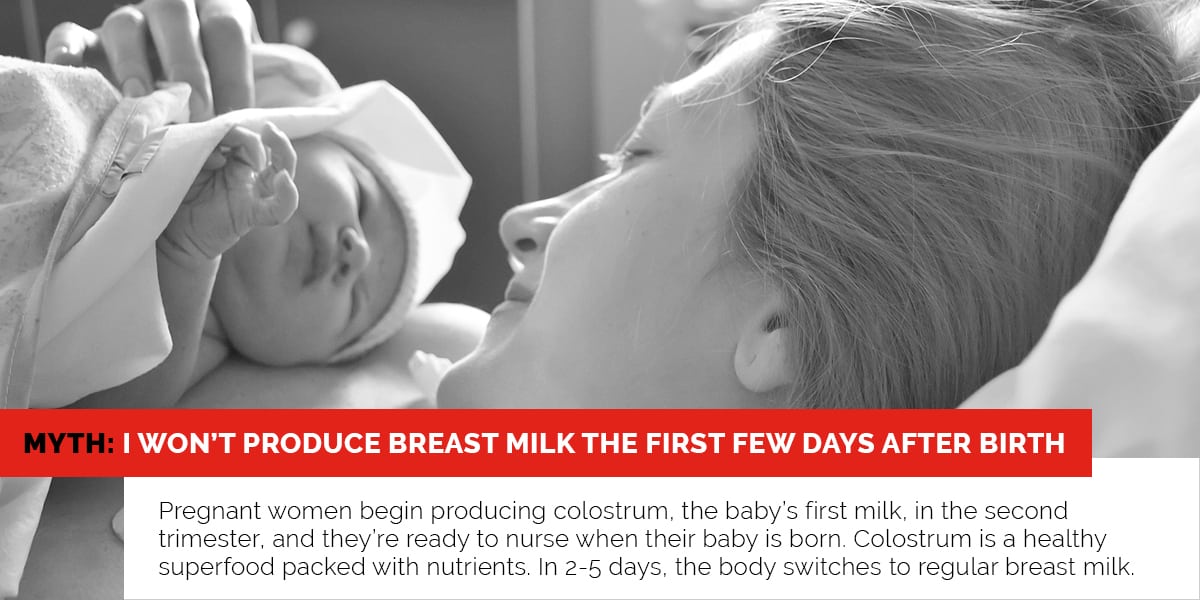
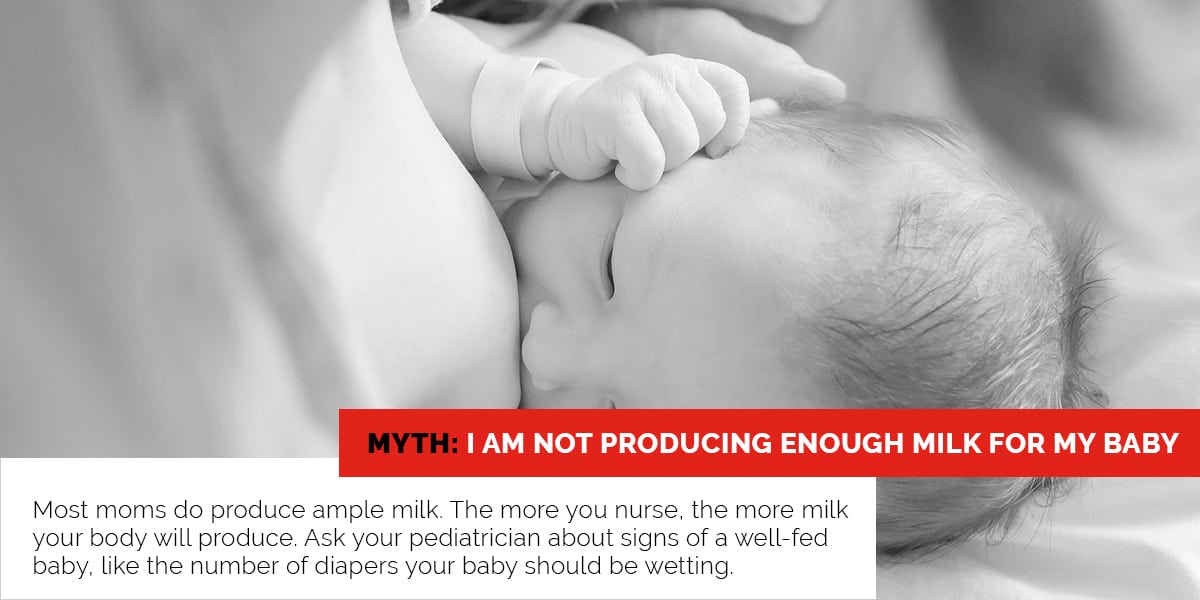
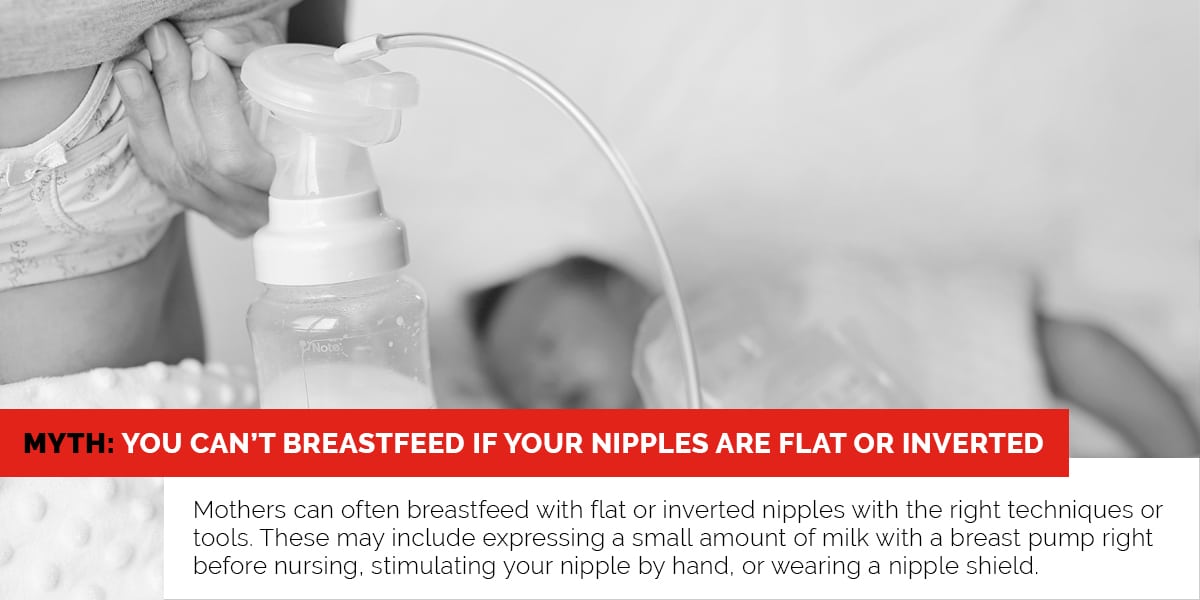
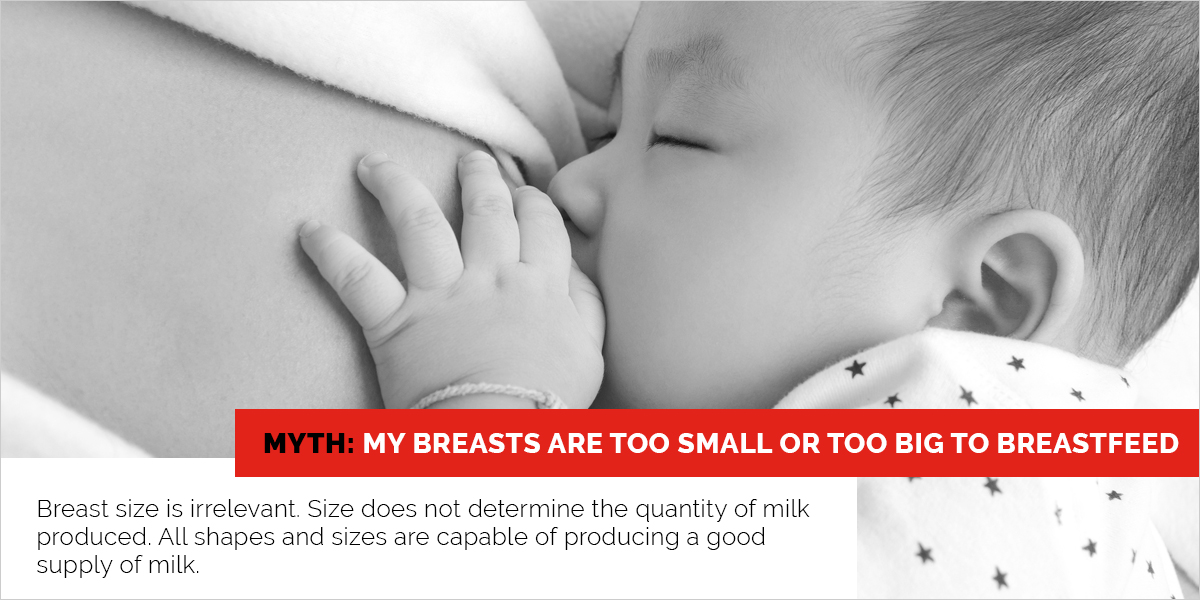
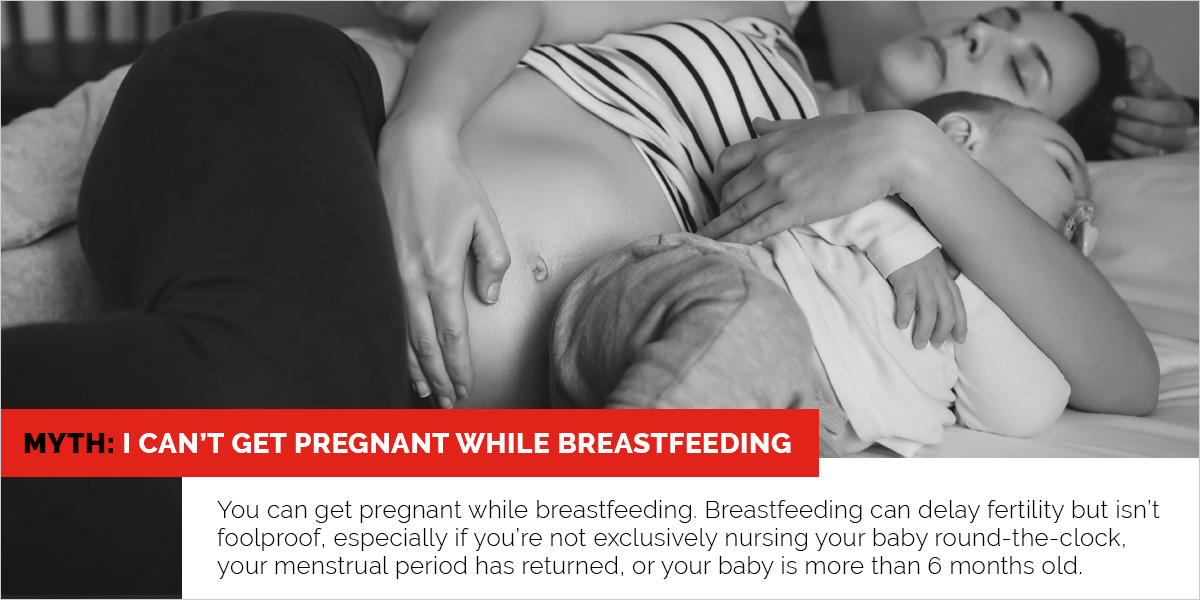
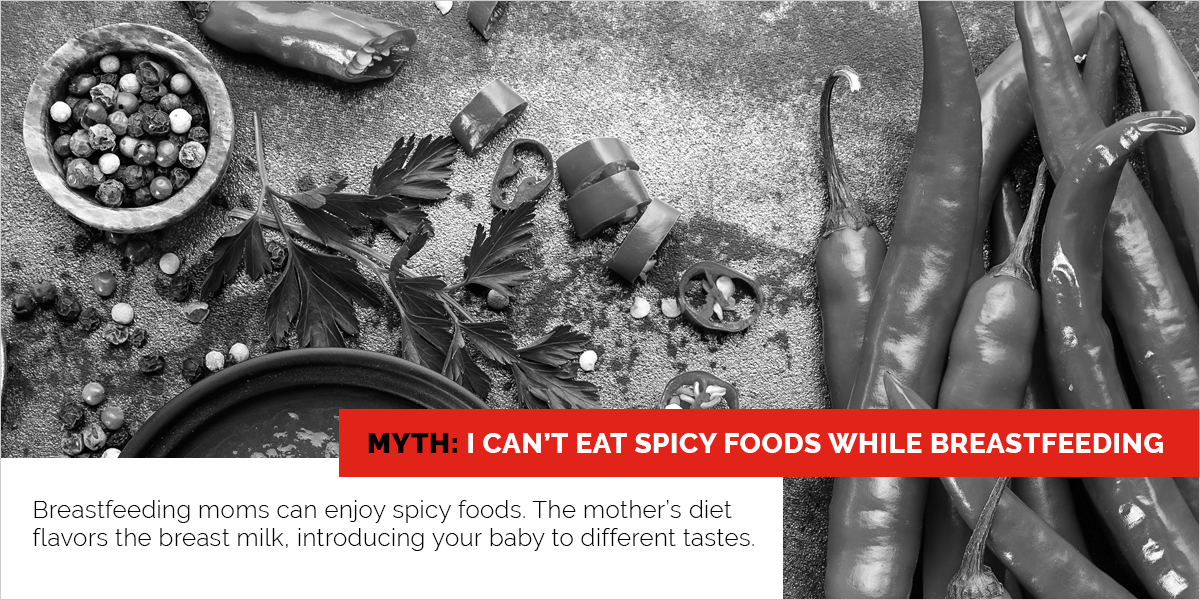
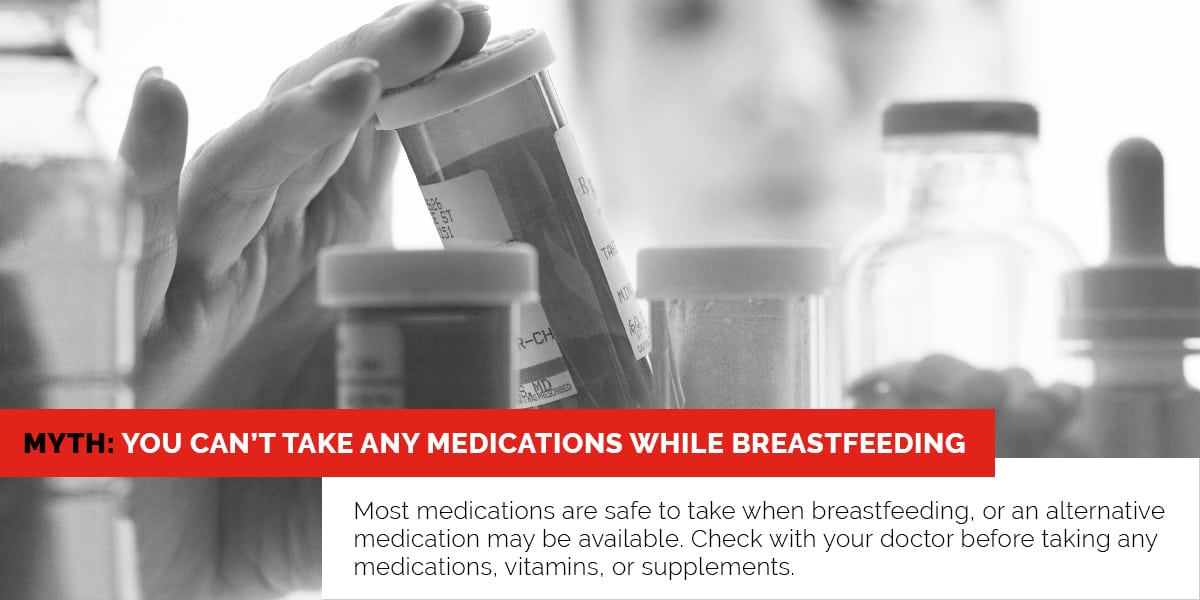
MYTH: I can’t take any medications while breastfeeding.
Most medications are safe to take while breastfeeding, or a safe alternative can be substituted. For example, some pain medications like acetaminophen and ibuprofen and some antibiotics are considered safe. But each medication should be considered individually, so check with your doctor before taking any prescription or over-the-counter medication or supplements, including vitamins and herbs. It’s rarely necessary to stop breastfeeding temporarily or permanently to take a medication, but if you are advised to stop temporarily, using a breast pump and discarding the milk can keep up your milk production until you are able to breastfeed again.
MYTH: My breasts are too big or too small to breastfeed.
Any breast size is capable of producing a good supply of milk. For all sizes, the more you nurse, the more milk you’ll produce. When a woman says her breasts are too small, Mulholland tells her that what matters is not the size but that her breasts have changed during pregnancy. For those who are larger-breasted, lactation experts can give them tips for breastfeeding comfortably and helping the baby latch on.
MYTH: I can’t eat spicy foods while breastfeeding.
“Can I eat this, can I eat that?” worried moms often ask. New mothers can eat almost everything they like, including spicy foods. The mother’s diet flavors the breastmilk consumed during nursing so if the mother enjoys a balanced diet with varied flavors, the child may be open to more foods when they start eating solids. Breastfeeding parents should avoid fish that’s high in mercury—such as shark, tuna, swordfish, and tilefish.
MYTH: You can’t breastfeed if your nipples are flat or inverted.
Some people have flat or inverted nipples that may make nursing more challenging because the baby may have trouble latching on. In some cases, the nipples come out on their own once you start breastfeeding. If not, many parents can still breastfeed successfully with the right guidance from a lactation consultant. Some helpful techniques include rolling and stimulating the nipples before putting the baby on the breast, wearing a nipple shell or nipple shield, and expressing milk with a breast pump for a few minutes right before nursing to draw out the nipples, Mulholland says.
Mulholland tells new parents it’s worth the effort to get their baby’s breastfeeding off to a good start.
Additional Resources
Learn more about newborn feeding from NewYork-Presbyterian experts.

